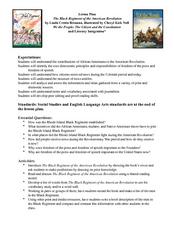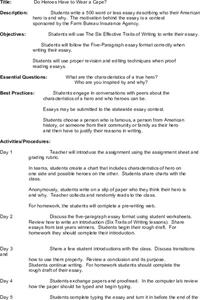Curated OER
Linguistic Diversity. Languages in Canada - Elementary
Create a language mosaic to reveal the linguistic diversity in your community. Pupils interview a person with a home language other than English and contribute to a bulletin board display representing the variety of languages spoken. The...
Curated OER
Module: Understanding the Workplace
Are your scholars future business owners? This college and career readiness activity will give them some poignant questions to help determine if they are budding entrepreneurs. They complete a checklist to see if they score within the...
Curated OER
What Makes a Novel a Novel?
They always say to write what you know. This approach is used to get middle schoolers prepared to write novels of their own. Using a favorite book as a model, potential novelists respond to prompts that ask about characters, plot, main...
Curated OER
French 101: A Musical Introduction
Bonjour! Comment ça-va? Introduce your language learners to French by playing the song "Parce Qu'on Vient de Loin." They attempt to describe what the song says and learn some basic French greetings like bonjour, au revoir, je m'appelle,...
Curated OER
When Is a Noun a Verb? Examining Double Duty Words
The New York Times' Learning Network provides great lessons! This one uses articles from the paper to help readers understand homonyms like mail (verb and noun). It also includes an exercise in reading informational text. Links to the...
Curated OER
The Noughties
Take a look back at a decade your class will actually remember: the noughties. Guide discussion about events your class recalls from those years, and then have them analyze an article (included). Although not specified, learners need to...
Curated OER
Get the Message?
Remember Morse Code? High schoolers investigate ways in which people communicate and assess which communication methods are appropriate and effective in different situations. They evaluate how constant changes in the world of technology...
Curated OER
Lesson Plan 18: Art Project! Design Your Own Book Cover
Finished your novel? What’s next? Designing the book cover, of course. But how to begin? After examining the covers of published books and noting the common elements of these jackets, young novelists design a front and back cover for...
Curated OER
Snack Smart, Move More
What do lowfat yogurt, baby carrots, fresh fruit, and rice cakes have in common? They are all healthy snacks that can be eaten daily. Investigate healthy eating/snacking guidelines, learn how to make lowfat ice cream and practice some...
Curated OER
We the People: The Citizen and the Constitution: The American Revolution
The contributions of African-Americans to the American Revolution are the focus of this Social Studies and language arts instructional activity. After reading and discussing Linda Crotta Brennan’s The Black Regiment of the American...
Curated OER
Review Games
There are a multitude of games for reviewing almost any subject matter or lesson. The rules can be adapted to fit your own needs and levels. Most of these games have been borrowed from others and adapted. Football Review, Baseball...
Curated OER
Collecting Data to Learn About the People Around You
Human graphs, anyone? Did you eat fruit today? What is your favorite costume? Have your K – 6 learners graph the responses. Early elementary grades may count and compare while upper grades compare responses of different groups or make...
Curated OER
Que Tiempo Hace Alli?
Hace calor! Use hand signals to accompany weather-related vocabulary. Learners will remember the vocabulary better! They'll then research weather around the world and record it on a chart provided. Add a math component to this plan by...
NWT Literacy Council
Readers Theatre Scripts
Engage and entertain young learners with this collection of readers theatre activities. With over 25 different scripts, a wide range of topics are covered from simple counting and rhyming exercises to adaptions of popular children's...
Curated OER
Les Pays de l'Europe
How do you say Greece in French? What about Spain? Introduce your beginning speakers to 17 countries and what they're called in French. Each slide contains a country's name in English, its flag, and the French translation. Improve this...
Curated OER
La famille Simpson
Review basic French vocabulary with the Simpson family! Each of the 14 slides is easy to read, providing manageable text amounts for beginning French speakers. Vocabulary words such as mère, père, and frère are included. Do some choral...
Curated OER
Les Panneaux de Signalisation
How do I get to school? Review basic signal vocabulary with your beginning French language learners. Fifteen vocabulary phrases are shown. Examples include: il ne faut pas entrer and il faut aller tout doit. All of the phrases include...
Curated OER
KWHL Jacob Have I Loved
Your class has just begun reading Jacob Have I Loved, and they're coming upon the fifth chapter. Pause their reading and have them complete a KWHL chart (not included) to detail what they've learned from the novel's beginning. An example...
Curated OER
Courage: Hero Traits
What does it mean to be a hero? Who qualifies as a hero? In groups, middle and high schoolers brainstorm a list of heroes and create a list of characteristics that a person must possess in order to be a hero. Extend this lesson by having...
Curated OER
Hobbies
How many different hobbies can you name in French? Using this question, French classes are asked to list as many hobbies as they can. Although the activities themselves are not included in this teacher guide, you could create them...
Curated OER
Quel temps fait-il?
Hit all the basics with this lesson plan, focusing on weather, greetings, and dates! Start by singing a weather related song ("Quel temps fait-il by Barbara MacArthur is suggested), and then read a story about getting ready for school....
Curated OER
Exploring Careers
Now that your career explorers are thinking about the world after high school, it's time they learned how to research their options! Here's a great resource to get them gathering information from multiple sources. Learners brainstorm...
Curated OER
Do Heroes Have to Wear a Cape?
Young writers choose a person from American history, their community, or their family to use as the subject of a persuasive essay. The process begins with a discussion of the characteristics of a hero, the completion of a prewriting web,...
Curated OER
Lesson Plan 3: Great Book, Gross Book
It's time for your scholars to become book reviewers! Start with a fun review of foods: are they good or gross? Learners apply these evaluation techniques to books, recording their thoughts on large pieces of butcher paper. Simply have...

























